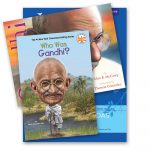Week 1: Early Life
Character Lexicon
- fearful: feeling afraid; showing fear or anxiety
- religious: relating to or believing in religion; the practice, or worship of a divine being
- shy: being reserved or having or showing nervousness or timidity in the company of other people
- outspoken: frank in stating one’s opinions, especially if they are critical or controversial
- courageous: not deterred by danger or pain; brave
Comprehension Questions
- Mohandas Gandhi and his followers walked two hundred and forty miles to the town of Dandi and it took them twenty-four days. (Pg 1)
- Gandhi traveled to the town of Dandi to protest the unfair Salt Act laws. (Pg 2)
- The name Mahatma means, “Great Soul.” (Pg 3)
- As a child Gandhi was afraid of thieves, snakes, ghosts, and the dark. (Pg 8)
- Gandhi’s friend convinced him to go against his family’s wishes and belief in being vegetarian and ate meat for about a year. (Pg 14)
- After high school Gandhi traveled to England to attend school and become a lawyer. (Pg 16)
- While he lived in England Gandhi became a member of the London Vegetarian Society, which gave him a community. (Pg 24)
Week 2: Life’s Work
Character Lexicon
- peaceful: free from disturbance; tranquil
- renowned: known or talked about by many people; famous
- respected: deeply admired or esteemed
- cleanly: in a way that produces no dirt; without difficulty or impediment
- loyal: giving or showing firm or constant support or allegiance to a person or institution
Comprehension Questions
- Gandhi had trouble with his first case as a lawyer in India because he was so shy that when he stood up to present his case his head and the court began to spin. (Pg 28 )
- Gandhi chose to stay in South Africa, rather than go home because he wanted to stand up for the rights of Indians in South Africa. (Pg 35)
- During the Boer War, Gandhi helped the British army by organizing an Indian ambulance corps with more than a thousand volunteers who collected soldiers from the battlefield and nursed them back to health. (Pg 41)
- In the newspaper, Indian Opinion, Gandhi wrote about what was happening in the government; shared ways to cure sickness with use of natural medicines and wrote about the benefits of a vegetarian diet. (Pg 42)
- Gandhi urged Indians to protest bad laws in South Africa by using the principle of satyagraha, non-violence and civil disobedience. (Pg 43-44)
- Gandhi supported the British after they entered World War I, because he though supporting Britain would help India gain its independence. (Pg 58)
- To protest the Rowlatt Acts of 1919, Gandhi called for a hartal, a one day strike in which Indians would not go to work. (Pg 60)
Week 3: Later Life and Legacy
Character Lexicon
- kind-mannered: having or displaying a kind, gentle manner
- steadfast: resolutely or dutifully firm and unwavering
- mighty: possessing great and impressive power or strength
- truthful: telling or expressing the truth; honest
- engaging: charming and attractive
Comprehension Questions
- In 1920, Gandhi became the leader of the Indian National Congress (INC). (Pg 69)
- Gandhi urged the Indian people to boycott British cloth so that more money would stay with the people of India. (Pg 70)
- The third non-violent method Gandhi used to protest British rule was the fast, a refusal to eat. (Pg 71)
- Manilal, Gandhi’s son went back to South Africa and became the editor of the Indian Opinion, and to continue the work Gandhi had begun. (Pg 74)
- In 1924, Gandhi fasted for three weeks to try and get Hindus and Muslims to talk and listen to each other. (Pg 78)
- Gandhi spoke at the Round Table Conference of 1931, to call for an independent India. (Pg 87)
- Gandhi spent his time in London walking in the slums of London and talking to the poor. He even had tea with King George V and Queen Mary of England. (Pg 88-89)

